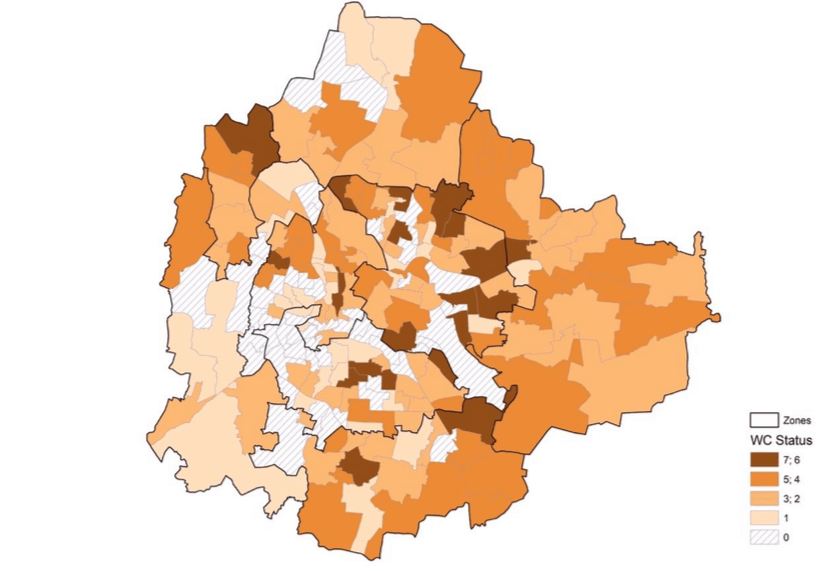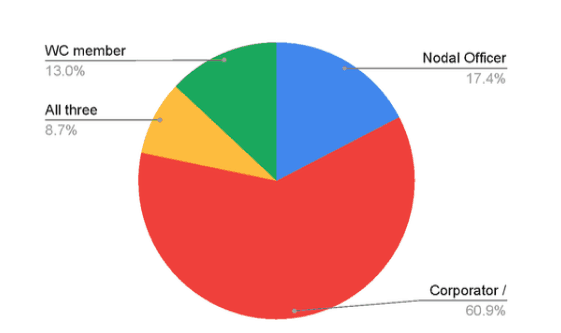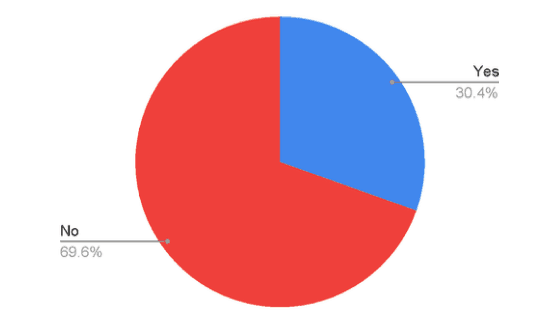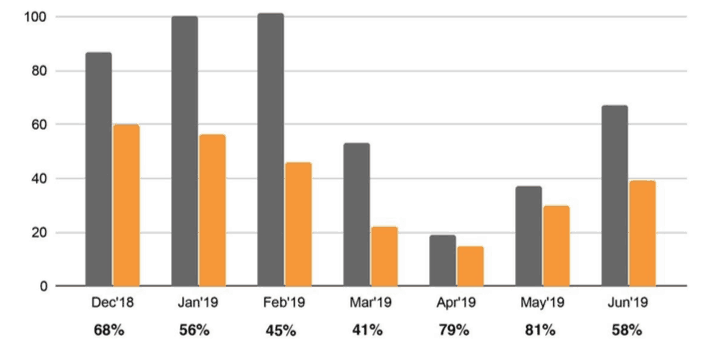Ward committees are supposed to make citizens the co-decision makers in governance of their ward. The idea is to entrust citizens with ward-level planning, budgeting and monitoring of BBMP services/schemes, and to leave corporators to focus on broader systemic issues of the city.
But a recent study by Sensing Local Foundation revealed that the ward committees in Bengaluru were mostly ineffective. The foundation studied ward committees across 22 wards over four months, from July to October. The researchers found that while citizens were keen to attend the meetings, corporators often didn’t turn up, and the ward committee members didn’t resolve issues or plan for the ward.
Worse, a quarter of the wards (52) didn’t hold any of the mandated monthly meetings over the seven-month period from December 2018 to June 2019. Each of the 198 wards should have had seven meetings over this period. A mere 12 percent wards held even five out of seven meetings.

Number of ward committee meetings held between December 2018 and June 2019
Participation of citizens high, corporators low
Across ward committee meetings, citizen attendance was high, with one meeting having as many as 50 participants. In comparison, ward committee members’ participation was low. In half of the 22 meetings studied, just five or fewer ward committee members had participated. (The ward committee includes 10 nominated members, the corporator as chairman, and a BBMP officer as secretary.)
The corporators themselves were not present in many meetings; sometimes their proxies conducted the proceedings for namesake, and took decisions on project approvals and fund release. Though corporators are supposed to conduct meetings, the study showed that only 60.9 percent of the meetings were conducted by corporators or their proxies.

Who anchors ward committee meetings?
No agenda set for meetings
As per UDD guidelines, the agenda for each WCM should be prepared after taking inputs from all ward committee members, and should be shared publicly a week before the meeting. But there was no agenda in around 70 percent of the meetings. Even when an agenda was set, it was not shared with citizens beforehand. The process of creating the agenda is inconsistent and ambiguous as well, the study says.
This results in meetings that are highly unstructured, often functioning as grievance redressal platforms.

Meetings that have a pre-determined agenda
Ward committees members not given info, not accountable
Worse, ward committee members don’t have access to ward data, ward maps, information on the programmes of works to be carried out, ward budgets and so on. In the absence of the data, it is impossible for them to plan or monitor works. The members are not being held accountable for their attendance in the meetings, or resolution of issues either.
No protocols followed, no results
The meetings become ineffective as they have no protocol for:
- Reaching out to citizens to take stock of issues: This leads to poor representativeness of issues, and geographic and demographic blind spots.
- Resolving issues: Resolution is often based on the personal experiences of ward committee members, who often lack the technical know-how. Also, a lot of time is spent on issues not resolvable at the ward level. For example, ward 111 (Shantala Nagar) spent 45 minutes of their July meeting on discussing BMRCL’s proposed land acquisition around All Saint’s Church, without any conclusion.
- Approving project proposals: The ward committee is supposed to prepare and submit a ‘ward development scheme’ for BBMP to consider in its annual budget. The committee should also ensure proper use of funds under the scheme. But most ward committees have not prepared the scheme itself, and hence don’t have a framework to evaluate new projects being proposed in the meetings. For example, in the July meeting in Shantala Nagar ward, the corporator proposed setting up a dialysis centre. He asked ward committee members to unanimously approve the project, but gave no further details despite requests.
- Sharing Minutes of Meeting (MoM): MoM is crucial for accountability and tracking progress of issues. But no standard process is followed for documenting minutes, ensuring their accuracy, or getting signatures of corporator/officials so as to fix accountability. Also, only 60 percent of ward committees are uploading MoMs on the BBMP website, and that too only in Kannada.

Number of meetings held vs MoMs uploaded
- No standard venue, intimation on meetings: Information about upcoming meetings are usually shared on social media and forwarded to people. Citizens get intimation just a day or two before the meeting, in contravention of the 2016 UDD (Urban Development Department) notification that require information to be given a week before. The study also noted two cases where the meetings were cancelled without formally informing citizens. Meetings were also held in varied locations like park, corporator office and government buildings, and the venues kept changing. This affected citizens’ awareness and participation in meetings.
What’s the solution?
The study recommends the following solutions:
- Ward committee members must ensure that only the corporator – and not his proxy – chairs the meeting.
- Give an option to conduct the meeting either on the first or third Saturday of the month. Currently, the first Saturday of every month is set aside for the meetings, but it’s difficult to ensure all officers’ availability on that specific day.
- Confirmed meeting venues should be made available on BBMP website
- MoMs have to be recorded and communicated in both English and Kannada, within a week of the meeting. These should be recorded in the prescribed format, and signed by all ward committee members confirming their accuracy.
- Ward-related information should be put up on a notice board in the ward office, and also made available digitally.
- Agenda of the meeting has to be prepared in consultation with ward committee members, and made available to all stakeholders and citizens a week before the meeting. BBMP should integrate civic technology and dashboards, and budget and works data into the meetings.
- Mandating the presence of officials/representatives from BBMP Engineering and Health departments, BWSSB, BTP, BCP and BESCOM at meetings can throw light on ground realities and challenges, and lead to discussions on solutions.
- Focus on ward development schemes, ward budgets and grievance redressal equally, and divide the meeting time between these.
- There should be a single streamlined channel for resolution, where issues, actions taken and progress can be tracked, so that all stakeholders can get complete information on an issue. An example is the format followed by IChangeMyCity’s platform MyCityMyBudget. And this should further feed into the agenda setting for future meetings.
- Ward committee members should be mandated to attend a minimum number of meetings. The attendance register should be digitised and made public.
- Clear roles and responsibilities must be accorded to all ward committee members. Individual members can take leadership of specific sectors and be accountable for those.
- Provide all ward-level data in usable format, such as decisions of BBMP Standing Committees, details of BBMP properties and revenue streams, ward-level works and schemes etc.
- A process for regular outreach to capture emergent issues in the ward, so as to set the meeting agenda. This can be done through surveys, temporary booths, RWA meetings, Watsapp circles etc that are public and widely publicised.
- A systematic way of setting the agenda to capture aspects that are both sectoral (waste, water etc) and task-based (monitoring, planning etc).
- Ward committee members should have additional meetings to work dedicatedly on ward development scheme and budgeting. This can include creation of the SWM ward action plan, monitoring the state of potholes etc.
- Submission of the monthly Action Taken Report (ATR) in standardised formats that are made publicly accessible.
- Training of ward committee members including corporator, nodal officer and the 10 citizen-nominated members on the workings of the ward as well as technical aspects like creating ward development scheme and budgeting. Technical support should be provided through manpower as well.